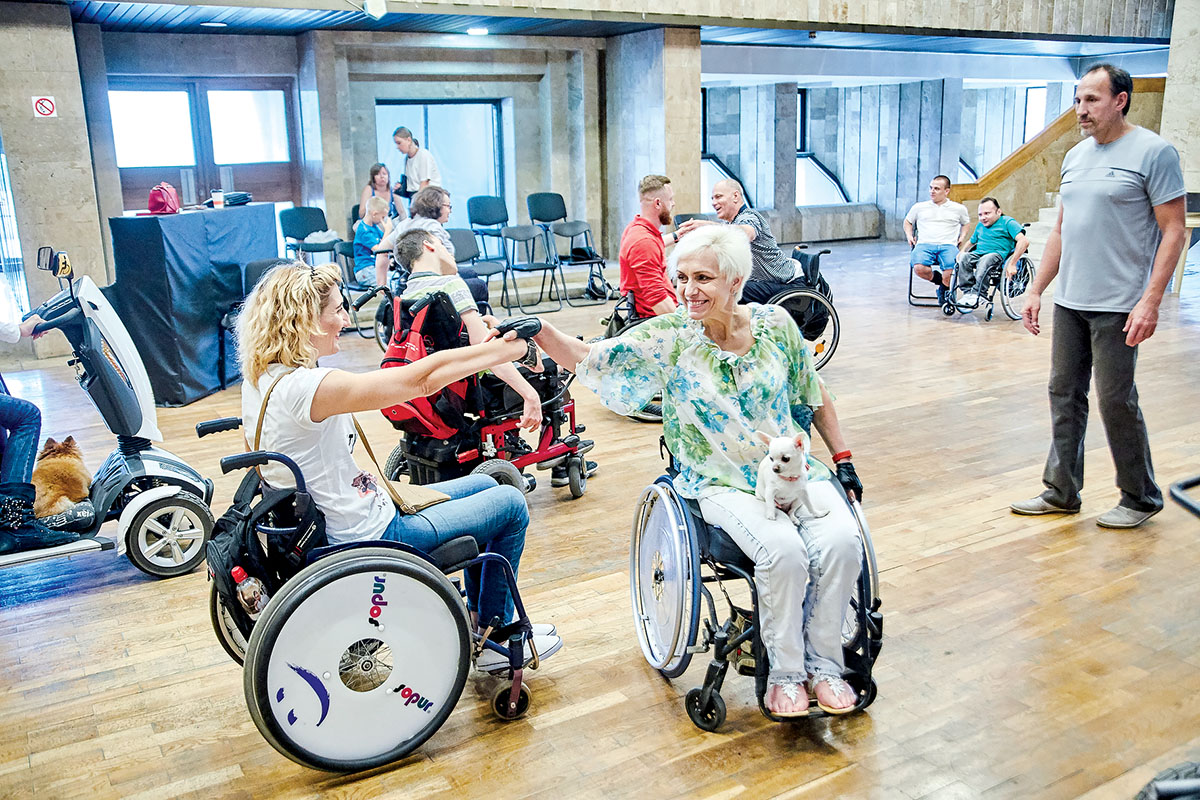When Iryna Soroka recalls the first time she took part in a catwalk show, she says it was the most exciting experience she ever had. Soroka, 24, has a congenital disability and needs a wheelchair to get around.
Until recently, her routine was similar to that of many other Ukrainians with disabilities: She worked as a freelancer and spent most of her time at home.
Now, she is among the students of Inclusive Model Agency, which says it is the first model agency in Ukraine devoted to preparing people with disabilities for a professional modeling career.
The agency started at the end of July in Kharkiv, the city of 1.4 million people located some 480 kilometers east of Kyiv. It currently educates 30 Kharkiv residents. They learn how to pose for photographers, perform in catwalk shows and prepare for the hyper-competitive industry of modeling.
“I decided to take these classes to show that people with disabilities are beautiful and we can also work in this area,” Soroka says.
The students are now getting ready to participate in the upcoming local fashion week, to be held in Kharkiv on Oct. 11–12.
But this agency is not just about fashion. Its employees also help students socialize and gain confidence.
Elena Shyngaryova, the agency’s founder and a founder of Creavita, a Kharkiv nongovernmental organization that supports people with disabilities, says her goals include shattering stereotypes about people with disabilities and publicizing the problems they face.
Currently, an estimated 5 percent of Ukraine’s 42-million population, or 2.1 million people, have physical disabilities. Shyngaryova, who also uses a wheelchair for mobility, says people with disabilities in Ukraine are still too “invisible to society.”
“Our society has no idea that we exist and many of us are active and successful,” Shyngaryova says. “We aim to change this attitude.”
First catwalk shows
Shyngaryova took part in a Kharkiv fashion show for the first time seven years ago. It was the first inclusive catwalk show in Kharkiv, mixing models with and without disabilities.
“It was an amazing experience and also a turning point,” she says.
Since then, more people with disabilities have taken part in local fashion shows, prompting the idea of the agency.
“Everything is changing so fast, including the world of fashion. Now, people with disabilities can perfectly fit in the world of fashion due to their individuality and their abilities,” Shyngaryova says.
In June, the team won a Hr 165,000 ($6,500) grant in a competition run by the Kharkiv City Council to launch their project, enabling them to make their classes tuition-free for students. On July 20, Shyngaryova and Creavita’s team conducted a competition to select models for their school.

People with disabilities learn how to perform in catwalk shows during a workshop at Inclusive Model Agency in Kharkiv in August 2019. (Illia Pshenychnyi)
Study hard
They received more than 50 applications from all across Ukraine, far more than expected. Inclusive Model Agency was able to register 30 students, twice as many as planned.
Soroka and other agency students have classes twice a week where they learn about fashion and its history, take acting lessons and study makeup and photography. Soroka says they are taught such things as how to breathe properly and how to follow healthy diets. They go out on photo shoots together and get tips from local fashion designers, makeup artists and professional models.
Shyngaryova says they hope to help their students sign contracts with Ukrainian and foreign model agencies and pursue careers in fashion.
Socialization
Ukrainians with disabilities face daily problems, including a lack of accessible public transport or education. Despite the hardships, Shyngaryova says it is important for people with disabilities to “step out of the shadow” and socialize.
“The more people with disabilities take part in various projects, the more society knows about them. That would really help in breaking these negative stereotypes,” Shyngaryova says.
She believes that such classes give people great opportunities to fully participate in life.
“It’s like a breath of fresh air,” Shyngaryova says. “And the more we talk about the achievements and successes of people with disabilities, the faster society’s attitudes will change for the better.”
Soroka, who is determined not to let her condition keep her out of the modeling business, says that the agency really helped her to change her routine, meet new people and become more confident.
“When we communicate with different people during the courses, they start to realize that we are the same people as they are, we all are equal,” Soroka says. “That is why I believe that there should be more such projects.”
